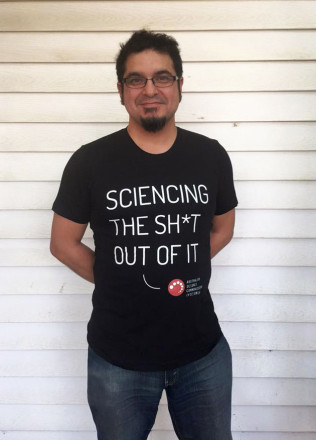I would like to thank Australian Science Communicators offering me a grant to subsidise my work experience with an ABC Radio National program where I spent a week in November 2015. I was extremely fortunate to be awarded The Peter Pockley Grant for Professional Development in Investigative Journalism.
Based in Brisbane (I am from Perth), my internship enabled me to work with the program team who coordinate and run ‘Conversations with Richard Fidler’.
Conversations is an immersive experience. The format is simple: an hour spent in the life of someone else. To quote their Facebook page “’Conversations with Richard Fidler’ draws you deeper into the life story of someone you may have heard about, but never met. On any given day ‘Conversations with Richard Fidler’ might take you from a remote Chinese village, to inside the cockpit of a space shuttle, to a family home in the middle of a war zone, to a hospital on the side of an African volcano, to the mysteries of the human brain, or to the pitch of the MCG. ‘Conversations with Richard Fidler’ is funny, provocative and often deeply moving.
My experience at the ABC was all of these things.
Running for over 10 years, the small team of four do an amazing job. While based in Brisbane, they spend much of the year traveling to writer’s festivals and other cities to access guests to interview. Their output and the product they create is astonishing. The program has won several awards including being named iTunes Australia’s ‘Best Classic Podcast” and ‘Most Downloaded Podcast’ 2015.
When visiting it was clear that they are all extremely passionate about sharing the stories of Australians and others – whether they be famous, infamous, a relatively unknown person, or just an Aussie with an amazing life story or tale to share.
Pam O’Brien is Senior Producer of the program was my supervisor for the week and was so very generous with her time, particularly considering how busy she is.
During the week I gained experience in pitching stories for the show, the intricacies of an outside broadcast, putting a show to air, how to use the media program and database, researching for the show, how guests are selected and how putting together scripts for the show.
During my internship week ‘Conversations with Richard Fidler’ guests were widely varying and included:
The whole experience was a thrill and a privilege. It consolidated information and communication skills I already had while teaching me many new things too.
I’d like to once again thank the ASC for supporting this once in a lifetime experience. I am an enormous fan of ‘Conversations with Richard Fidler’ and the work they do, so it was a dream come true!
If you have a story that you think should be told, or know someone whose experiences and work could make for good listening. ‘Conversations with Richard Fidler’ might be an interesting vehicle for the story. You can submit your idea/suggestion via their website.
I’d also like to encourage those who may not have listened to any of Richard’s podcasts to get online and listen to one or two. With over 10 years of programming you have more than 1500 stories, all free, to download.
If you would like to listen to a more science related topic, I can recommend the following: How Creswell Eastman saved a million brains.
Cres Eastman was one of the guests I researched and whose file I worked on.
Storytelling is an ancient means for sharing information and there is an art to it. If we can start telling more stories that showcase science, it can only be a good thing. Humans connect with stories and remember them. It’s inbuilt in us.
The more science stories out in the world, especially those that present scientists or people working in the field of STEM as “regular” people or provide science in a real-life context, the better. It’s another way we can communicate science and the paths that people in science have taken to get to where they are. As you all know, a science degree can take you many places, and through vehicles like this one we can demonstrate the diversity of where science can take you and how it connects with everyday lives. This medium can link with audiences who may not normally consider how science effects them and can connect with those disengaged from science.
Let’s start telling more stories for science!
If you would like to hear more about my experience or have any questions, please feel free to contact me via emmadonnelly22@yahoo.com.au.

